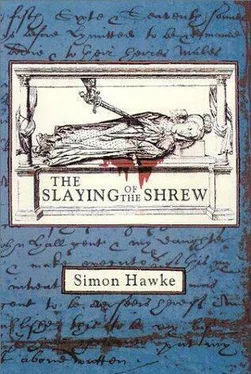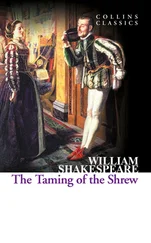Simon Hawke - The Slaying Of The Shrew
Здесь есть возможность читать онлайн «Simon Hawke - The Slaying Of The Shrew» весь текст электронной книги совершенно бесплатно (целиком полную версию без сокращений). В некоторых случаях можно слушать аудио, скачать через торрент в формате fb2 и присутствует краткое содержание. Жанр: Исторический детектив, на английском языке. Описание произведения, (предисловие) а так же отзывы посетителей доступны на портале библиотеки ЛибКат.
- Название:The Slaying Of The Shrew
- Автор:
- Жанр:
- Год:неизвестен
- ISBN:нет данных
- Рейтинг книги:5 / 5. Голосов: 1
-
Избранное:Добавить в избранное
- Отзывы:
-
Ваша оценка:
- 100
- 1
- 2
- 3
- 4
- 5
The Slaying Of The Shrew: краткое содержание, описание и аннотация
Предлагаем к чтению аннотацию, описание, краткое содержание или предисловие (зависит от того, что написал сам автор книги «The Slaying Of The Shrew»). Если вы не нашли необходимую информацию о книге — напишите в комментариях, мы постараемся отыскать её.
The Slaying Of The Shrew — читать онлайн бесплатно полную книгу (весь текст) целиком
Ниже представлен текст книги, разбитый по страницам. Система сохранения места последней прочитанной страницы, позволяет с удобством читать онлайн бесплатно книгу «The Slaying Of The Shrew», без необходимости каждый раз заново искать на чём Вы остановились. Поставьте закладку, и сможете в любой момент перейти на страницу, на которой закончили чтение.
Интервал:
Закладка:
For her part, Elizabeth did not hesitate to exploit such masculine concerns, for the truth was, as Smythe knew, she had no great desire to be married, unless it were for love. Even then, she had her reservations, especially after the near disaster of her betrothal to Sir Anthony Gresham, which at least for the present had cured Henry Darcie of his desire to see his daughter quickly married off. But if he had become more cautious concerning potential suitors for his daughter, Henry Darcie had become no less so concerning Smythe’s involvement with her.
While he was grateful for the service Smythe had performed in saving his daughter from a terrible fate and himself from playing an unwitting part in a devilish foreign plot against the realm, which could easily have destroyed all hope of his advancement, Darcie was nevertheless not so grateful as to lose all sight of propriety, so Smythe and Elizabeth had to arrange to see each other on the sly.
“ Elizabeth!” Smythe said, taking her hand in his and raising it gently to his lips.
“I have missed you,” she said in that forthright manner that he found so absolutely charming, lowering her mask so he could see her lovely face.
“And I you,” he replied. “I was so glad to get your message. I trust that nothing is amiss? Your family is well?”
“All is well at home,” she said. “ ‘Twas kind of you to ask about them, as they do not inquire about you.” She smiled, mischievously. “You have heard about the wedding of Godfrey Middleton’s eldest daughter, Catherine?”
He nodded. “I have. The Queen’s Men have an engagement to entertain the wedding party with the performance of a play.”
She gazed at him anxiously. “I know. So then… you are going to be there?”
“Yes, I shall.” He frowned. “Why? Are you not coming?”
“Of course I will be there,” Elizabeth replied. She took his arm and they started walking slowly down the aisle, past the busy market stalls. “I am to be the maid of honor to the bride. Catherine Middleton is my very good friend. But the last time that you and I spoke, Tuck, you seemed uncertain about your standing with the company and I did not know if things had changed for you since then.”
“Well, they have not dismissed me from their service yet, if that is what you mean,” Smythe said. “For all of my appalling lack of talent, it appears I am still useful to them, albeit mostly in roles that do not require my presence on the stage.”
She rolled her eyes. “You know, I do not think that you are nearly so inept as you portray yourself.”
“There is an entire company of players who would give you a good argument upon that score,” said Smythe, with a self-deprecating grin. “And as my Uncle Thomas used to say, ‘ ‘Tis a wise man who knows his limitations.’ I am well aware of mine, Elizabeth, for better or for worse.”
“Then why do you persist in your desire to be a player? You told me once that you had learned the craft of smithing from your uncle, and that he had also taught you how to forge fine blades. Both pursuits are honorable trades. Why, a good armorer could, with the right patronage, achieve a reputation and advance himself into the gentry. That would not be out of your reach, you know. My father is already indebted to you, as is Sir William. Both men, I am quite certain, would be more than willing to assist you if you wanted to set up in trade. And if you were to become a gentleman, why then, Father could have no possible objection to our seeing one another.”
“ Elizabeth,” said Smythe, squeezing her arm gently, “your father has objected to more than one gentleman already. And aside from that, becoming a gentleman does not always solve one’s problems. My father is a gentleman, with his own escutcheon, for all the good that it has done him.”
She stood and stared at him, startled. “What! But you have never told me this!”
He merely shrugged. “I saw no reason to make mention of it.”
“No reason! No reason, indeed! You mean to tell me that you come from a good family? That your father is a gentleman, a country squire, and you came to London to become an ostler?” She stared at him with disbelief.
“I came to London to become a player.”
“Well, you were an ostler when we met and, in any event, a player is not much better than an ostler in my father’s eyes. But do not try to change the subject! Why did you not tell me?”
“Because I do not see what difference it could possibly have made,” said Smythe.
“To me, none,” Elizabeth replied, “but ‘twould have made a world of difference to my father!”
“Methinks not,” said Smythe. “ ‘Twould only have made matters worse, if your father knew the truth of it.”
“Whatever do you mean? What truth?”
“My father is a very vain and foolish man,” said Smythe, without any trace of bitterness or rancor. “I know ‘tis disrespectful to speak so of one’s parent, but if it makes me a bad son to speak the truth, so be it, then. The truth is that my father wanted so to be a gentle-man, to have an escutcheon of his own that he could blazon upon the windows and the mantle and the entryway, embroider upon the blue coats of his servants and gild upon his coach, that he spent a goodly portion of his inheritance in currying favor and paying bribes and buying influence. In time, and at no little cost, he was able to achieve his goal and was eventually granted his escutcheon by the heralds, which he then proceeded to affix to everything you could imagine, from his pewter cups to his gauntlets and his handkerchiefs of Flemish lawn and sarcenet. Meanwhile, my Uncle Thomas, to whom I had been sent for rearing, had no such lofty ambitions or pretensions. Even if he had, he could ill afford them, for ‘twas my father as the eldest who had been favored in the will.”
“And you mean to say he never helped your uncle?” asked Elizabeth.
“That matter was never formally discussed with me, but I am as certain that my uncle never asked as I am that my father never offered,” Smythe replied. “Who is to say but that had my father raised me, instead of Uncle Thomas, then perhaps I might have turned out more like him, so I am grateful that my uncle was much more of a father to me than the man whose name I bear.”
“But it nevertheless is the name of a gentleman,” Elizabeth said.
“Aye, a gentleman who was not satisfied with having achieved the rank that he had bought so dearly and instead newly set his sights upon a knighthood. To which end, he spent himself very nearly into debtors’ prison. He is now little better than a pauper, and the truth is I rather doubt your father would find very much about him of which he could approve.”
“For all that they seem to have so much in common,” Elizabeth said, wryly, referring to her father’s own considerable social ambitions. “Oh, but Tuck, why did you never tell me this?”
“As I have said, I saw no reason for it. My father is my father, for better or for worse, as I am myself. I have no part of his accomplishments or failures. I prefer to be judged on my own merits, or the lack of them, whichever the case may be. And ‘twas never my desire to be like my father, or my Uncle Thomas, for that matter, for all of the respect and love I bear him. Toiling at a forge is hard and honest work, good work, and I believe I am an able craftsman, but the truth is that it has never been my passion. Ever since I saw my first play acted out upon a tavern stage, I have wanted to become a player. ‘Tis all I ever wanted. Nothing more.”
“And your father did not approve, of course,” Elizabeth said, nodding with understanding.
“Aye, he did not. He stormed and thundered, threatened to disown me, but I would not give up my dream, and in the end, when he had squandered what was left of his inheritance-and mine-I realized at last that there was nothing left to hold me, and so I left home and came to London to pursue my dream. Perhaps I am as vain and foolish in that as my father was in his pursuit of social position and a knighthood, so who am I to judge him?”
Читать дальшеИнтервал:
Закладка:
Похожие книги на «The Slaying Of The Shrew»
Представляем Вашему вниманию похожие книги на «The Slaying Of The Shrew» списком для выбора. Мы отобрали схожую по названию и смыслу литературу в надежде предоставить читателям больше вариантов отыскать новые, интересные, ещё непрочитанные произведения.
Обсуждение, отзывы о книге «The Slaying Of The Shrew» и просто собственные мнения читателей. Оставьте ваши комментарии, напишите, что Вы думаете о произведении, его смысле или главных героях. Укажите что конкретно понравилось, а что нет, и почему Вы так считаете.












